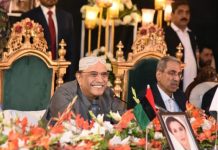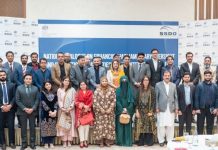ISLAMABAD, SEP 28: /DNA/ – Under the initiative of PIDEAS (PIDE IDEAS), Research for Social Transformation and Advancement (RASTA) program is producing documentary films based on the evidence-based research produced at the Pakistan Institute of Development Economics (PIDE) on pertaining public policy issues. In this regard, PIDE-RASTA has organized a documentary film screening event at the Islamabad Club. This was the first session in the documentary film series.
Federal Minister for Planning, Development, and Special Initiative Professor Ahsan Iqbal graced the event as the Chief Guest and acknowledged the role of PIDE in generating policy-informed debates on these critical yet neglected topics.
Professor Ahsan Iqbal also highlighted the significant role of the current government for youth by encouraging innovative ideas, providing opportunities, and creating an enabling environment for distinctive skills. The Youth Affairs Wing is playing an active and assertive role in materializing these objectives
The event was attended by relevant stakeholders, including academicians, policymakers, practitioners, development partners, civil society, and public and private sector representatives. “Research without debate is useless,” said Dr. Nadeem Ul Haque, Vice Chancellor, PIDE. “PIDEAS initiative will help us to generate and disseminate research-based ideas, inform policy debate, and suggest actionable solutions for change and growth in Pakistan,” he added further.
The visual format has always remained one of the most engaging and key conversational tools for producing research, and in the wake of using this as an instrument for knowledge production and dissemination. Therefore, three films were screened at the event: Rethinking Urban Mobility in Pakistan based on PIDE research titled ‘Rethinking mobility (urban transport policy) in Pakistan‘; An Unending Wait for Car: Own Money based on PIDE research titled ‘The Issue of Own Money’; and No Country for the Youth based on PIDE research titled ‘Opportunity to Excel: Now and the Future.
Mr. Muhammad Afnan Alam, Deputy Director General (Land & Estate), CDA led the debate on urban mobility in the context of Islamabad. The research-based film suggests that cities are the engine of growth because cities are where development and innovation happen. In addition, labor force, industries, and economic corridors exists in cities. For an effective transport and urban mobility policy, we need to highlight the areas of population, employment, densification, and intensification around our cities, followed by linking all these corridors with one another.
Mr. Razi-ur-Rahman, Group Director, Corporate Affairs of Atlas Group & CEO APL shared his views about the Car Own Money. The research-based film suggests to eliminate the own money premium, the booking culture needs to be demolished. No vehicle can be sold or booked that has not been manufactured and is not available at the dealership. Furthermore, the supply needs to be increased through increased production by local manufacturers/assemblers and allowing selective imports of vehicles.
Mr. Ahmad Iqbal, Former Mayor of District Norowal was the speaker on the youth documentary. The research-based film suggests that Pakistan currently has the largest percentage of young people ever recorded in its history; more than 50 percent of the population in Pakistan are youth. The documentary highlighted the issues of youth unemployment, lack of opportunities, housing provision, and soft skills in Pakistan.
Earlier, PIDE’s Pro Vice-Chancellor, Dr. Durre Nayab, in her welcoming remarks, said that through PIDEAS initiative, PIDE is stimulating content creators and filmmakers to articulate their artistic expressions and bringing research and policy closer to people.
According to the Press Release issued at the event, it was stated that the intent is to debate pressing public policy issues and facilitate engagements between different stakeholders to typify the issues of socio-economic significance, cross-fertilize ideas through knowledge sharing, and prescribe actionable ways forward.
Considering the overwhelming response from the audience and policy circles, we intend to continue such initiatives in the future, bringing policy closer to the people, and building the art-research-practice nexus in Pakistan, said Dr. Faheem Jehangir, Project Director of RASTA.
These films will be available on PIDE’s social media platforms soon for broader dissemination.

















